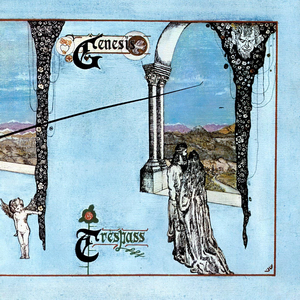
Trespass (album)
Trespass is the second studio album by the English rock band Genesis. It was released on 23 October 1970 on Charisma Records, and is their last album with original guitarist Anthony Phillips and their only album with drummer John Mayhew.
For other uses, see Trespass (disambiguation).Trespass
Genesis turned professional in autumn 1969, and began to rehearse intensely and play live shows. After several months of touring they secured a recording contract with Charisma Records, and entered Trident Studios in London in June 1970 to record Trespass. The music marked a departure from more pop-oriented songs, as displayed on their first album From Genesis to Revelation, towards folk-flavoured progressive rock. This ranged from light acoustic pieces with multiple twelve-string guitars such as "Dusk", to the heavier live favorite "The Knife". The sleeve, featuring a knife slash across the front, was the first of several to be designed by Paul Whitehead.
Shortly after recording, Phillips decided to leave the group, which almost caused Genesis to split. After discussing the situation, they agreed to continue, and replaced Mayhew with drummer and singer Phil Collins. Trespass was not a major success upon release; it failed to chart in the UK and the US and it received some mixed reviews from critics, but it was commercially successful in Belgium, which helped sustain the band's career. A reissue briefly charted the UK top 100 in 1984.
Background and recording[edit]
In August 1969, Genesis decided to become a professional band. The founders – guitarist Anthony Phillips, bassist Mike Rutherford, vocalist and flautist Peter Gabriel, and keyboardist Tony Banks – had been joined by drummer John Silver.[4] They split from producer Jonathan King and decided to write more complex material than the straightforward pop on their first album From Genesis to Revelation. Gabriel recalled that the group wanted to explore and mix musical styles.[5] The group bought new equipment, including a bass guitar and a Hammond organ, and recorded songs at Regent Studios for a demo, including "White Mountain" and "Family" (which became "Dusk"). Silver then left to study in the US.[4]
In September, Genesis played their first live shows as a professional band, touring the local club and university circuit, with new drummer John Mayhew.[6] Mayhew, the oldest and most experienced musician, came from a different background to the rest of the band. Phillips recalled that, despite their efforts to make him feel comfortable, the drummer was unsure of his playing.[7] In early 1970, they secured a six-week residency at Ronnie Scott's jazz club in Soho, London, during which they were spotted by Charisma Records producer John Anthony. He persuaded label boss Tony Stratton Smith to sign them.[8] The group wanted to branch out from their earlier pop-oriented style, and write and perform songs that were unlike any other band at the time.[9] Rutherford later said that gigging was "tough, but a good way of getting the music into shape".[10] Two songs that made it to the next album, "Looking for Someone" and "Stagnation", were recorded for a BBC session in February 1970.[11]
In June 1970, they retreated to Trident Studios in London to record a new album. Anthony joined them as their producer and engineer, and the songs were recorded on 16-track tape.[9] Phillips remembered that recording was only "slightly more sophisticated" than on From Genesis to Revelation, and thought Anthony disliked having someone "drop in" individual parts. He remembered a session in which Rutherford had to listen to several minutes of the track before putting down a guitar part; by which time he had become too nervous and played it incorrectly.[12] The group had enough material to record two albums, but felt some songs were not strong enough. They selected the strongest material for Trespass.[9][13] They worked well with Anthony, and later recalled that his contributions were important and helped shape the album.[14]
Artwork[edit]
The album cover was painted by Paul Whitehead and features an engraving by Hungarian illustrator Willy Pogany. Whitehead also did the covers for the band's next two albums.[34] The cover showed two people looking out of a window at mountains, which represented the pastoral themes of some of the songs.[35] Whitehead had finished the cover and then the band added "The Knife" to the running order. Feeling that the cover no longer fitted the mood of the album, they asked Whitehead to re-design it; when he was reluctant to do so, the band members inspired him to slash the canvas with an actual knife.[34]
Whitehead's original illustrations for the three albums were stolen from the Charisma archives when it was sold to Virgin Records in 1983. Whitehead claimed that Charisma staff got wind of the imminent sale and proceeded to loot its office.[36]
Release[edit]
Trespass was first released in the UK on the Charisma label in October 1970.[37][38] In the US, it was first issued on ABC's jazz label, Impulse!.[39] "The Knife" was released as single (split into two parts) in May 1971, but did not chart.[40]
The album was reissued by the main ABC Records label in 1974;[41] then, after MCA Records bought out ABC, it was reissued on the MCA label.[42] It was issued on CD in 1994 as a definitive edition remaster. A SACD/DVD double disc set (including new 5.1 and Stereo mixes) was released in 2008.[43]
Genesis
Production